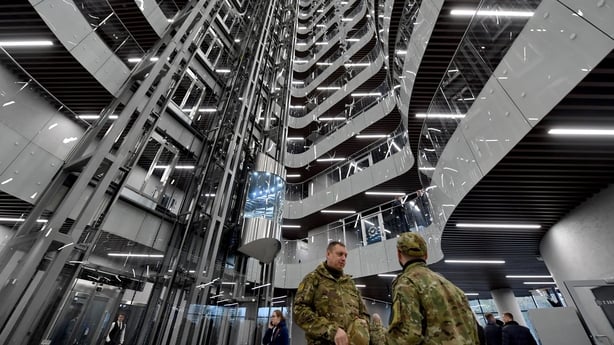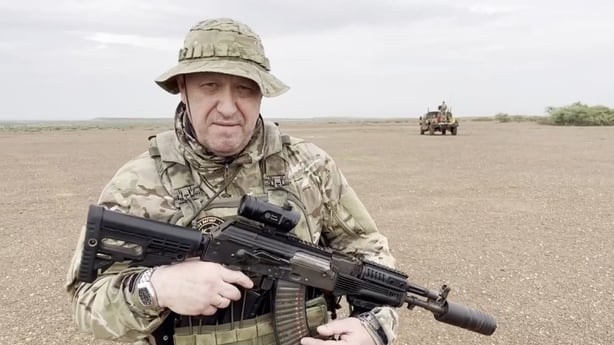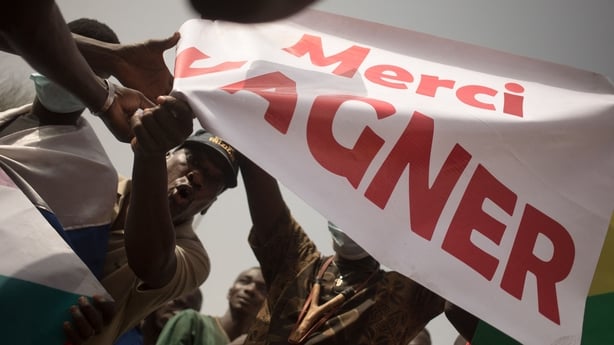Yevgeny Prigozhin's funeral took place in his home city of St Petersburg earlier this week.
Mourners, some wearing army fatigues, laid red roses and carnations on the grave of the former leader of Wagner Group PMC, the mercenary group.
It was a quiet farewell for a man who led a brash and loud life.
From hotdog seller in St Petersburg to leader of a multi-billion dollar private army, known for its brutality, Mr Prigozhin’s life was anything but mundane. Even his death was a dramatic spectacle.
Russia’s president Vladimir Putin, who had known Mr Prigozhin for more than two decades, did not attend the funeral.
Kremlin officials have said that an investigation is under way into the cause of the plane crash, in which Mr Prigozhin, two of his top commanders, four bodyguards, and three crew died on 23 August.
By Mr Prigozhin’s own estimate in June, 25,000 fighters are contracted to Wagner, which has conducted military operations in more than a dozen African countries since 2015, as well as Syria, and fought in Russia's full-scale invasion of Ukraine.
What is the Kremlin’s strategy for dealing with this force of Wagnerites?
In a move to bring the group's fighters to heel, just three days after the plane crash, Mr Putin signed a decree ordering anyone involved in supporting Russia's military to sign an oath of allegiance to the Russian state.
It is unclear how many Wagnerites will sign the oath of allegiance. There has been little criticism of the Kremlin so far on various Telegram channels associated with the group, a sign that its fighters could be waiting for the ministry of defence to clarify the future of the group's leadership.
"The Kremlin is vitally interested in keeping Wagner going," Maria Domanska, a senior fellow at the Centre for Eastern Studies in Warsaw, told RTÉ News.
She said that Russia's leadership will want to appoint a new military commander of Wagner who is "fully loyal to the Kremlin", while maintaining the group's "legally blurred status".
According to Russia's criminal code, private military companies are illegal. To bypass this, Russian PMCs remain unregistered. Even Wagner PMC's own legal status remains unclear despite running an enormous corporate headquarters in St Petersburg.

Wagner has suffered huge losses fighting in Ukraine after a surge in recruitment numbers last year.
A Wagner-affiliated group claimed in May that 22,000 Wagnerites had been killed, and more than 40,000 wounded in the war in Ukraine, largely sustained during the group's headlong assault on Bakhmut earlier this year.
Kyiv said in July that only a few hundred Wagnerites remain in Ukraine.
About 4,000 of its fighters remain in Belarus, according to estimates by the Hajun Project, a Belarusian activist group that monitors military in the country – the same number as before Mr Prigozhin’s death last week.
An estimated 5,000 Wagnerites continue to operate in a number of African countries, including Burkina Faso, Libya, Mali, Sudan and the Central African Republic (CAR).
Wagner operatives in Africa are generally more experienced mercenaries, and trained to a higher standard than the thousands of raw recruits who joined Mr Prigozhin's ranks in Ukraine. And it is those operations in Africa that the Kremlin will now look to control more closely.
The group has spent years strengthening the Kremlin's political and economic interests in African countries where it operates, influencing public opinion favourably towards Russia through disinformation campaigns directed by Mr Prigozhin.
As many as 1,000 of its operatives may still be based in the CAR, where the group provides security to the country’s President Faustin-Archarge Touadera, whom it helped to keep in power in 2018 by repelling a coup.

For all the blood that Wagner has exerted and spilled in Africa, it has been rewarded in treasure.
Under Mr Prigozhin, the group carved out lucrative mining concessions for precious metals and diamonds, particularly in the CAR, one of the world’s poorest countries, as payment-in-kind for the group’s services.
Mr Prigozhin had developed close ties with the ruling elites of African countries where Wagner operates. His death now leaves the Kremlin with the task of appointing someone who can preserve those ties, and lucrative contracts for raw materials.
"I can imagine a scenario where they will appoint someone who was connected to Prigozhin but did not support the rebellion," Agnieszka Legucka, a Russia policy analyst at the Polish Institute for International Affairs, told RTÉ News.
Ms Legucka listed Andrei Troshev, a retired Russian army colonel who did not support Mr Prigozhin's mutiny in June, as a contender for the role of Wagner chief.
Mr Troshev, 61, known in Wagner circles by his nom de guerre 'Sedoy’, meaning 'grey hair’ was a founding member of Wagner PMC and took part in the group’s actions in Syria almost a decade ago. He is currently sanctioned by the European Union and the UK.
Another contender for the job is Vitaly Perfiev, a 40-year-old leader of Wagner’s current operations in CAR, and security advisor to the country’s president Mr Touadera.
Mr Perfiev is also sanctioned by the EU and the UK.
The Russian military has long provided transport, logistical and medical support to Wagner in Africa, while the group maintained operational autonomy on the ground.
Removing that support would make it difficult for Wagner units in Africa to maintain their current operations.
Russian minister of defence Sergei Shoigu, often the target of Mr Prigozhin’s video tirades on the handling of the war in Ukraine, is likely to bring Wagner under his ministry’s direct command, but still continue to give the group a degree of autonomy in Africa.
However, the Kremlin will find it more difficult to control the Wagnerites in Africa than in Ukraine, Belarus and Russia because, said Ms Legucka, "they can offer their services direct to African leaders".

Mr Prigozhin's death, coming just two months after his one-day mutiny, will act as a warning sign for other Russian PMCs who may think about disobeying the Kremlin's orders.
Molfar, a Ukrainian open-source intelligence agency, estimates that there are as many as 37 Russian PMCs in existence with two-thirds of them operating in Ukraine.
Ms Domanska said that Mr Prigozhin's death was the first time that Mr Putin "killed an opponent or traitor", as he had labelled the former Wagner boss in June, and "broke his guarantees of safety".
"It means that the elite members cannot trust Putin anymore."
The Kremlin's spokesperson Dmitry Peskov told reporters last week that suggestions from the West that Russia's leadership was behind Mr Prigozhin's death were "an absolute lie".







